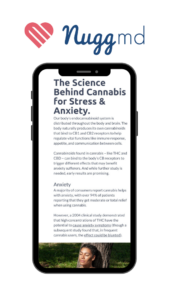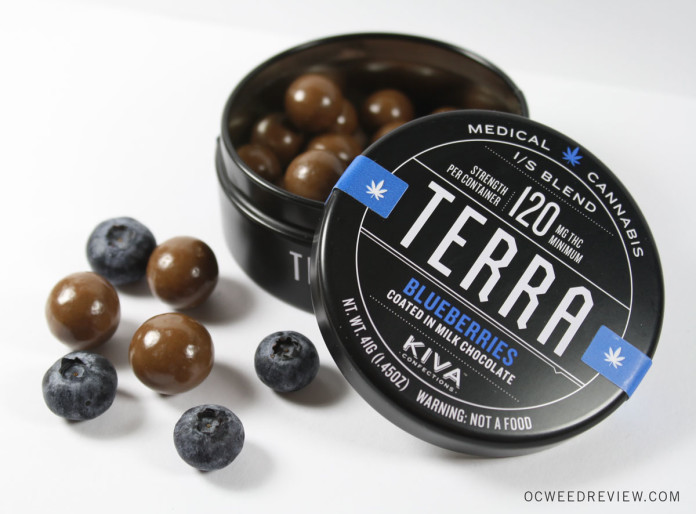In This Article
- What is COPD? What are the signs, and what causes it?
- Signs and Symptoms
- What Causes COPD?
- Can marijuana cause COPD?
- Smoking Cannabis vs Smoking Tobacco
- The Role of Frequency of Use
- Is there a link between marijuana and COPD?
- Can weed make COPD worse?
- Can cannabis help treat or alleviate COPD?
- Is vaping weed less harmful than smoking when it comes to COPD?
- What precautions can COPD patients take when using cannabis?
- Cannabis in COPD Care
- References
If you or someone close to you is dealing with the challenges of chronic obstructive pulmonary disease (COPD), you're part of a broad community seeking relief.
COPD is a progressive lung disease characterized by increasing difficulty in breathing, often caused by long-term exposure to irritants that damage the lungs and airways. In the United States alone, the Centers for Disease Control and Prevention (CDC) estimates that nearly 16 million adults are living with COPD, and many more may be undiagnosed.
While smoking tobacco has long been recognized as a significant contributor to COPD, there’s a growing curiosity about the role of cannabis. Many wonder, “Can you get COPD from weed?” – a question that’s increasingly relevant as more states legalize cannabis use.
We’ve consulted with Dr. Brian Kessler, our Chief Medical Officer at NuggMD, to find out once and for all: Can marijuana cause COPD? With his expertise, we’ll explore the latest research and insights on the effects of cannabis use and COPD.

Find natural, lasting relief with our comprehensive (and completely free) patient’s guide to medical cannabis for stress and anxiety relief.
What is COPD? What are the signs, and what causes it?
COPD refers to a group of progressive lung diseases. The most common forms of COPD are chronic bronchitis and emphysema. Emphysema gradually destroys air sacs in your lungs, interfering with outward airflow, while chronic bronchitis involves a long-term cough with mucus.
Signs and Symptoms
The signs of COPD can often be subtle and grow more severe over time. They include:
- Shortness of breath, particularly noticeable during physical activities
- Wheezing, characterized by a whistling or squeaky sound while breathing
- Chest tightness
- A persistent cough accompanied by mucus (sputum) that may vary in color from clear to yellowish or greenish
- Frequent respiratory infections
- General fatigue and low energy levels
- Unintended weight loss (in later stages)
- Swelling in ankles, legs, or feet
What Causes COPD?
Smoking tobacco is the most common cause of COPD. The smoke irritates the lungs, leading to a chronic inflammatory response, which causes changes in the lung's structure and function. These changes include narrowing the small airways and destroying lung tissue needed for oxygen exchange, typical features of emphysema, and chronic bronchitis.
In addition to smoking, other factors include exposure to some gasses or fumes, substantial quantities of secondhand smoke and pollution, frequent use of a fire without proper ventilation, and genetic factors that can also contribute to the development of COPD. It's important to note that not all smokers develop COPD, and not everyone with COPD has a history of smoking.

Can marijuana cause COPD?
As the prevalence of cannabis use increases, a pressing question in respiratory health is, “Does smoking weed cause COPD?”
Dr. Brian Kessler addresses this query by highlighting the mixed evidence, “Some studies indicate that smoking cannabis can increase the risk of COPD, but others suggest limited impact on its development.”
Smoking Cannabis vs Smoking Tobacco
To fully grasp this relationship, it's crucial to compare smoking cannabis with smoking tobacco. Both tobacco and cannabis smoke contain several harmful substances that can cause lung inflammation and damage, a significant factor in the development of COPD.
However, cannabis contains cannabinoid compounds, including delta-9 tetrahydrocannabinol (THC), which is not found in tobacco. This compound and other cannabinoids have been shown to possess immunosuppressive and anti-inflammatory properties, potentially offering some protective effects against inflammation-driven lung tissue injury.1
Moreover, the frequency of consumption differs. Cannabis users typically smoke fewer cigarettes than tobacco smokers, which might reduce overall exposure to harmful smoke components. However, smoking cannabis involves larger inhaled volumes and longer breath-holding times, potentially increasing exposure to toxic components per cigarette.
Given these biological and behavioral differences, the full impact of cannabis smoking, especially heavy use, on the development of COPD remains unclear.2
The Role of Frequency of Use
According to research, occasional and non-cumulative use of cannabis is not considered a significant risk factor for the development of COPD. This suggests that light or infrequent cannabis smoking may not have the same impact as regular tobacco use.3 However, concerns arise with long-term, heavy use of cannabis. Studies have indicated an association between increasing cannabis use and a higher prevalence of COPD.4
Is there a link between marijuana and COPD?
Current research offers varied perspectives on the link between cannabis and COPD. One notable study of hospitalized patients with COPD found that cannabis users had significantly lower odds of in-hospital mortality and pneumonia compared to non-cannabis users. This finding suggests that cannabis use might not exacerbate COPD to the same degree as tobacco use, potentially offering some protective effects despite occasional reports of respiratory discomfort among some users.5
Still, it's crucial to recognize the challenges in drawing firm conclusions. Many cannabis smokers also use tobacco, complicating efforts to isolate the specific effects of cannabis.
A comprehensive review of existing studies and research cautions that due to limited and inconsistent data, definitive conclusions about the association between cannabis use and COPD are elusive. The review reveals inconsistencies but suggests a possibility that smoking cannabis alone may lead to modest airflow obstruction and hyperinflation, potentially predisposing individuals to COPD later in life.6

Can weed make COPD worse?
Many COPD patients who are considering cannabis as part of their symptom management strategy may be wondering if cannabis use, mainly smoking weed, makes the condition worse.
Dr. Kessler addresses this concern by stating, “We’re still in the early stages of understanding how cannabis affects COPD. What we know is that, compared to tobacco smokers, COPD patients who use cannabis don’t seem to experience a more severe progression of the condition.”
A recent study analyzing data from the National Inpatient Sample found that among patients hospitalized for COPD, cannabis use does not significantly affect in-patient mortality or the need for intubation compared to non-users.7
Additionally, a comprehensive study reported in the Journal of the COPD Foundation found that among tobacco smokers with over 20 pack-years (the number of packs smoked per day multiplied by the total years of smoking), those who also smoked cannabis did not exhibit a significantly worse progression of COPD. This was true for both current and former cannabis smokers, suggesting that cannabis smoking might not exacerbate COPD symptoms as severely as tobacco smoking.8
For COPD patients considering cannabis use, alternative methods like edibles might be worth exploring. These methods bypass the respiratory system, potentially reducing the risk of exacerbating respiratory symptoms associated with smoking. The specific effects of non-smoking cannabis consumption on COPD require further study.

Can cannabis help treat or alleviate COPD?
The potential of cannabis, especially cannabinoids like cannabidiol (CBD), to manage COPD is a growing area of interest. With their anti-inflammatory properties, these compounds are being explored as possible treatments for COPD symptoms, marking an early but promising field of study.
Dr. Kessler adds perspective to this evolving research, stating, “While there's some early research suggesting that cannabinoids like CBD could benefit COPD patients, it's still too early for any definitive claims.”
A study focusing on the impact of cannabis oil extract on airway epithelial cells has shown promising results. This research found that the extracts, which include CBD, CBDA, THC, and THCA, may affect gene expression and reduce inflammation in COPD.9 Such findings provide a glimpse into the potential of cannabis to influence vital cellular processes in this condition.
For those living with COPD and considering cannabis, how to use it is as important as whether or not to use it. Smoking, or even vaporization, might not be the best choice due to possible lung irritation. Alternatives like edibles, pills or capsules, or tinctures could offer a safer route, but it's crucial to seek advice from a healthcare provider first.

Is vaping weed less harmful than smoking when it comes to COPD?
For COPD patients, understanding the relative safety of vaping versus smoking cannabis is essential due to the risks associated with inhaling any substances. Dr. Brian Kessler notes, “Vaped cannabis hasn’t been shown to impact airway function in patients with COPD, but patients should still take caution when inhaling anything.”
Reinforcing this caution, a pivotal study focusing on vaporized cannabis flower found that inhaling 35 mg of 18.2% THC cannabis did not significantly affect breathlessness, exercise endurance, or airway function in symptomatic adults with advanced COPD.10
Vaping, which heats the cannabis to release active compounds without burning it, could potentially offer a safer alternative to smoking. COPD patients should proceed with caution and consult with healthcare professionals before trying dry herb vaping or any new method of cannabis consumption.

Find natural, lasting relief with our comprehensive (and completely free) patient’s guide to medical cannabis for stress and anxiety relief.
What precautions can COPD patients take when using cannabis?
If you have COPD and are considering using cannabis for relief, it's important to choose the best consumption method for you. Dr. Kessler advises, “Inhaling cannabis may not be the best option if you have COPD. Instead, try opting for methods like edibles, tinctures, and topicals.”
Nowadays, users have a broad range of smoke-free options to choose from, such as lotions, balms, creams, salves, gels, and patches. Other popular products include sublingual sprays, tongue strips, lozenges, gum, and even inhalers.11
It’s also worth considering the differences in effects between smoking methods such as joints, blunts, and spliffs. This information can be particularly beneficial for those with health considerations like COPD.
COPD patients might find benefits in exploring terpene-rich cannabis products. Myrtle oil, for instance, is often used as an expectorant in COPD management due to its eucalyptol, limonene, and pinene content, which is known for aiding expectoration difficulties.12
Research has shown that a blend of alpha-pinene, limonene, and cineole (eucalyptol) improves mucociliary clearance, an essential aspect of respiratory health, without altering lung function.13 Cineole, a prominent terpene, exhibits significant anti-oxidative and anti-inflammatory properties, which have been validated in clinical trials involving bronchitis, sinusitis, COPD, and asthma patients.14
COPD and cannabis use is all about personalization. It's worth discussing with your doctor to figure out the best fit, especially if you're already on a COPD treatment plan.
Cannabis in COPD Care
While cannabis may have potential benefits, especially in forms like edibles and tinctures, careful consideration is critical for individuals with COPD. As research progresses, it promises to clarify further how those with COPD can safely incorporate cannabis into their wellness routines.
References
- Holloman BL, Nagarkatti M, Nagarkatti P. Epigenetic Regulation of Cannabinoid-Mediated Attenuation of Inflammation and Its Impact on the Use of Cannabinoids to Treat Autoimmune Diseases. International Journal of Molecular Sciences. 2021; 22(14):7302. https://doi.org/10.3390/ijms22147302 ↩︎
- Tashkin DP, Barjaktarevic I. Marijuana Use as a Risk Factor for Chronic Obstructive Pulmonary Disease: Not There Yet. Am J Respir Crit Care Med. 2023;208(4):501-502. doi:10.1164/rccm.202303-0404LE ↩︎
- Gates P, Jaffe A, Copeland J. Cannabis smoking and respiratory health: consideration of the literature. Respirology. 2014;19(5):655-662. doi:10.1111/resp.12298 ↩︎
- Lehrer S, Rheinstein PH. Association of cannabis with chronic obstructive pulmonary disease and COVID-19 infection. Chronic Dis Transl Med. 2022;8(3):238-241. Published 2022 Jun 22. doi:10.1002/cdt3.38 ↩︎
- Gunasekaran K, Voruganti DC, Singh Rahi M, et al. Trends in Prevalence and Outcomes of Cannabis Use Among Chronic Obstructive Pulmonary Disease Hospitalizations: A Nationwide Population-Based Study 2005-2014. Cannabis Cannabinoid Res. 2021;6(4):340-348. doi:10.1089/can.2020.0133 ↩︎
- Tashkin DP. Does smoking marijuana increase the risk of chronic obstructive pulmonary disease?. CMAJ. 2009;180(8):797-798. doi:10.1503/cmaj.090142 ↩︎
- Nathani A, Reinoso Abreu JL, Vijayan K. The Impact of Cannabis Use on Patients Admitted With Acute Chronic Obstructive Pulmonary Disease Exacerbation: Results From the National Inpatient Sample. American Journal of Respiratory and Critical Care Medicine. 2023. 207:A2630. ↩︎
- Barjaktarevic I, Cooper CB, Shing T, et al. Impact of marijuana smoking on COPD progression in a cohort of middle-aged and older persons. Chronic Obstr Pulm Dis. 2023; 10(3): 234-247. doi:http://doi.org/10.15326/jcopdf.2022.0378 ↩︎
- Mamber SW, Gurel V, Lins J, Ferri FF, Beseme S, McMichael J. Effects of cannabis oil extract on immune response gene expression in human small airway epithelial cells (HSAEpC): implications for chronic obstructive pulmonary disease (COPD). Journal of Cannabis Research. 2020;2(1). doi:https://doi.org/10.1186/s42238-019-0014-9 ↩︎
- Abdallah SJ, Bourbeau J, Jensen D, et al. Effect of Vaporized Cannabis on Exertional Breathlessness and Exercise Endurance in Advanced Chronic Obstructive Pulmonary Disease. A Randomized Controlled Trial. Annals of the American Thoracic Society. 2018. 15(10): 1146-1158. doi:https://doi.org/10.1513/AnnalsATS.201803-198OC ↩︎
- Spindle TR, Bonn-Miller MO, Vandrey R. Changing landscape of cannabis: novel products, formulations, and methods of administration. Curr Opin Psychol. 2019;30:98-102. doi:10.1016/j.copsyc.2019.04.002 ↩︎
- Shen Y, Huang S, Kang J, et al. Management of airway mucus hypersecretion in chronic airway inflammatory disease: Chinese expert consensus (English edition). International Journal of Chronic Obstructive Pulmonary Disease. 2018;Volume 13(13):399-407. doi:https://doi.org/10.2147/copd.s144312 ↩︎
- Dorow P, Weiss TE, Felix R, Schmutzler H. Effect of a secretolytic and a combination of pinene, limonene and cineole on mucociliary clearance in patients with chronic obstructive pulmonary disease. PubMed. 1987;37(12):1378-1381. ↩︎
- Sonawane GB, Mishra A, Rawat, S, et al. Incipient Need of Medical Plants in Targeting Chronic Obstructive Pulmonary Disease. In: Dua K, Chang D, Gupta G, Nammi S, Chellappa DK, Collet T, eds. Medicinal Plants for Lung Diseases. Springer Nature; 2021. ↩︎
The information in this article and any included images or charts are for educational purposes only. This information is neither a substitute for, nor does it replace, professional legal advice or medical advice, diagnosis, or treatment. If you have any concerns or questions about laws, regulations, or your health, you should always consult with an attorney, physician or other licensed professional.




